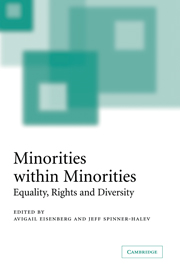Book contents
- Frontmatter
- Contents
- Notes on Contributors
- Acknowledgements
- Introduction
- Part I Toleration
- Part II Equality
- Part III Individual autonomy
- 7 Autonomy, association and pluralism
- 8 Sexual orientation, exit and refuge
- 9 On exit
- 10 Minors within minorities: a problem for liberal multiculturalists
- 11 Beyond exit rights: reframing the debate
- Part IV Self-determination
- Part V Democracy
- References
- Index
9 - On exit
Published online by Cambridge University Press: 22 September 2009
- Frontmatter
- Contents
- Notes on Contributors
- Acknowledgements
- Introduction
- Part I Toleration
- Part II Equality
- Part III Individual autonomy
- 7 Autonomy, association and pluralism
- 8 Sexual orientation, exit and refuge
- 9 On exit
- 10 Minors within minorities: a problem for liberal multiculturalists
- 11 Beyond exit rights: reframing the debate
- Part IV Self-determination
- Part V Democracy
- References
- Index
Summary
The idea that a member of a cultural minority ought to be able to exit from his or her community plays many roles in thinking about multiculturalism. I can see three roles for exit: first, in its most passive role – which I shall refer to as exit's “basic role” – exit simply figures as an option open to a member of a minority community as a citizen of the wider society. Here, exit exists as a derivative feature of a certain type of social ordering of culturally diverse – that of contemporary liberal democratic states.
However, when exit appears in multiculturalism theory, the roles it is asked to perform tend to be more active. One role – which I shall denote exit's “protective role” – calls upon exit to protect vulnerable group members against the oppression which they may suffer at the hands of their groups. The argument here is that exit can be relied upon to enable the group member to escape oppression by leaving the group.
The other role – which I shall label the “transformative role” – is related to the protective role in that both are concerned with remedying oppressive minority practices. Here, the claim is that exit can help cure a group of the oppressive elements of its distinct practices by exerting pressure to bring about their reform. Change will become desirable, perhaps inevitable, according to the argument for exit's transformative role, in order to prevent mass exodus through exit and thereby cultural annihilation.
Information
- Type
- Chapter
- Information
- Minorities within MinoritiesEquality, Rights and Diversity, pp. 189 - 208Publisher: Cambridge University PressPrint publication year: 2005
Accessibility standard: Unknown
Why this information is here
This section outlines the accessibility features of this content - including support for screen readers, full keyboard navigation and high-contrast display options. This may not be relevant for you.Accessibility Information
- 13
- Cited by
